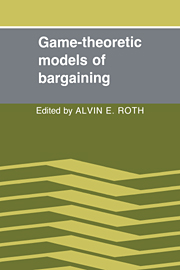Book contents
- Frontmatter
- Contents
- List of contributors
- Preface
- Chapter 1 Editor's introduction and overview
- Chapter 2 Disagreement in bargaining: Models with incomplete information
- Chapter 3 Reputations in games and markets
- Chapter 4 An approach to some noncooperative game situations with special attention to bargaining
- Chapter 5 Infinite-horizon models of bargaining with one-sided incomplete information
- Chapter 6 Choice of conjectures in a bargaining game with incomplete information
- Chapter 7 Analysis of two bargaining problems with incomplete information
- Chapter 8 Sequential bargaining mechanisms
- Chapter 9 The role of risk aversion in a simple bargaining model
- Chapter 10 Risk sensitivity and related properties for bargaining solutions
- Chapter 11 Axiomatic theory of bargaining with a variable population: A survey of recent results
- Chapter 12 Toward a focal-point theory of bargaining
- Chapter 13 Bargaining and coalitions
- Chapter 14 Axiomatic approaches to coalitional bargaining
- Chapter 15 A comment on the Coase theorem
- Chapter 16 Disclosure of evidence and resolution of disputes: Who should bear the burden of proof?
- Chapter 17 The role of arbitration and the theory of incentives
Chapter 11 - Axiomatic theory of bargaining with a variable population: A survey of recent results
Published online by Cambridge University Press: 23 September 2009
- Frontmatter
- Contents
- List of contributors
- Preface
- Chapter 1 Editor's introduction and overview
- Chapter 2 Disagreement in bargaining: Models with incomplete information
- Chapter 3 Reputations in games and markets
- Chapter 4 An approach to some noncooperative game situations with special attention to bargaining
- Chapter 5 Infinite-horizon models of bargaining with one-sided incomplete information
- Chapter 6 Choice of conjectures in a bargaining game with incomplete information
- Chapter 7 Analysis of two bargaining problems with incomplete information
- Chapter 8 Sequential bargaining mechanisms
- Chapter 9 The role of risk aversion in a simple bargaining model
- Chapter 10 Risk sensitivity and related properties for bargaining solutions
- Chapter 11 Axiomatic theory of bargaining with a variable population: A survey of recent results
- Chapter 12 Toward a focal-point theory of bargaining
- Chapter 13 Bargaining and coalitions
- Chapter 14 Axiomatic approaches to coalitional bargaining
- Chapter 15 A comment on the Coase theorem
- Chapter 16 Disclosure of evidence and resolution of disputes: Who should bear the burden of proof?
- Chapter 17 The role of arbitration and the theory of incentives
Summary
Introduction
In the traditional formulation of the bargaining problem, it is typically assumed that a fixed number of agents are involved. The possibility that their number varies has recently been the object of a number of studies, which it is the purpose of the present chapter to review in a unified way, with emphasis on the main results and on the main lines of their proofs.
I propose to evaluate solutions by focusing on their behavior in circumstances where new agents come in without their entry being accompanied by an expansion of opportunities. The standard economic problem that motivated much of the work presented here is that of dividing fairly a bundle of goods among a group of agents. The number of agents involved in the division is allowed to vary while the resources at their disposal remain fixed. (Technically, this implies that the intersection in utility space of the set of alternatives available to the enlarged group with the coordinate subspace corresponding to the original group coincides with the set of alternatives initially available to that group.) Of course, this does not mean that new agents are required never to bring in additional resources nor that their presence itself may not affect the alternatives available to the original group. I simply want to allow for the case of fixed resources, and I claim that a study of this special situation yields important insights into the relative merits of solutions.
- Type
- Chapter
- Information
- Game-Theoretic Models of Bargaining , pp. 233 - 258Publisher: Cambridge University PressPrint publication year: 1985
- 3
- Cited by



